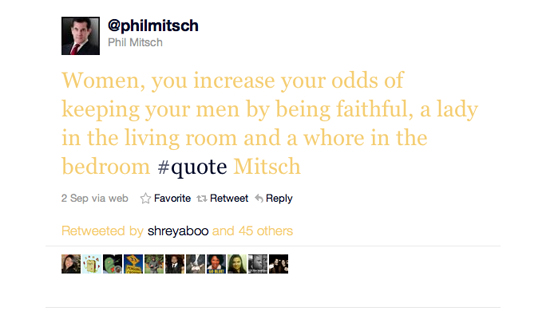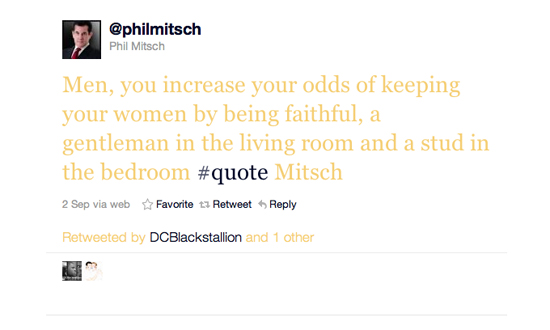
Why Don’t We Have More Women in Public Office? Look at Who’s Running the Campaigns0
Posted In Activism,Blog,Feminism,Politics,Relationships,Sex,Society
by Yashar Ali
Every election season, I ask myself the same question: Why aren’t more women running for public office?
Over the past ten years, I have been hopeful for the prospect and rise of women political candidates. While I never studied the numbers, I felt like we were heading in the right direction.
I couldn’t be more wrong.
Reporter Kate Linthicum’s brilliant Los Angeles Times article sheds light on the City of Los Angeles’ problem with proper female representation on the city council. The fifteen-member council, which had five female members eleven years ago, currently has just one, Jan Perry.
Current statistics about women holding federal office are equally dismal: women hold fewer than 20 percent of House and Senate seats. The House faced its first decline in 30 years with respect to women members.
Women hold fewer than 25 percent of seats in state legislatures. This sort of decline has not been seen in decades.
Why are we slipping back after so many years of slow but steady progress?
There exists real obstacles for prospective women politicians: media bias, lack of financial support, mediocre recruitment efforts, underfunded organizations built to help women run for public office.
I want to introduce a not-so-prominent problem: the serious deficiency of women in senior positions on political campaigns. With the exception of political fundraisers, you find very few women running campaigns or serving in top management spots.
The absence of women operating behind the scenes of political campaigns has been largely ignored. This is made clear by the complete absence of studies tracking the numbers of women working in politics. Open your newspaper and turn on your TV. You usually hear a senior-level male staffer speaking for candidates.
This isn’t just about my ideology. This is personal for me.
For the past two and half years, I worked for California Lieutenant Governor and former San Francisco Mayor Gavin Newsom. In my last position with him, I managed his 2010 race for Lieutenant Governor.
Lieutenant Governor Newsom and his wife, actress and documentary filmmaker, Jennifer Siebel Newsom (who made a brilliant documentary about women’s under-representation in positions of power and the limited and often disparaging portrayal of women in the media – see SG interview) expressed in this campaign their frustration and concern about the lack of women working on his campaigns.
Lieutenant Governor Newsom always asked, when we made hiring decisions, whether we could fill these posts with qualified women. This was not just a question for him. In his first year as mayor, he appointed San Francisco’s first female police chief and fire chief. He was also the first mayor to initiate gender analysis of budget cuts.
But I couldn’t find available and qualified women to take senior positions in his campaign. The few women I did know were already working on other campaigns.
Shawnda Westly, Executive Director of the California Democratic Party, saw a need to fix this problem in California. She, along with her colleague Robin Swanson, put their money where their mouth is, and launched a website called Political Women California.
Political Women California delivers a simple, but powerful mission: to give women working in politics a place to post their resumes so employers can find and hire them for campaigns, elections and political positions throughout California — and across the country.
Their site has been flooded with postings from women already working in politics in California. Even though I am not in the business of managing campaigns anymore, it helped me realize how many women are trying to work in politics.
Usually, people run for office after being exposed to a political campaign in one way or another. So the question is: how do we expect young women to motivate themselves to run for public office when all the people running campaigns are men?
This issue is not limited to Democrats. We need more women working on campaigns and in elective office across the political spectrum. Both parties should see the benefit of female leadership. But drawing from my personal experience, I want to speak to Democrats: There is no excuse. How can we demand equality for women in the workplace and fair wage laws, when we can’t manage to hire women for the campaigns professing these issues?
I spent the better part of two years working tirelessly for Hillary Clinton in her bid to be the 44th President of the United States. My passion for her candidacy was primarily based on my belief that she was the most qualified candidate for president. I felt her unique combination of experiences would serve our country incredibly well.
But there was another strong factor for my motivation. One I will not apologize for. I really wanted a woman president.
The dream I have for a woman president is not dead. However, if we don’t make conscious efforts to hire more women on political campaigns, we are not only limiting our talent pool, but we will also face an epidemic shortage of women running for office.
We must demand that candidates we support value diversity in their hiring practices. So, my message is for two people: the candidate and the campaign manager.
Next time you are walking through your campaign headquarters, take a look at the young woman who shows up everyday after her classes to volunteer. The same one who always pays her own way on public transportation to make phone calls and to help knock on doors. The same one that you are impressed by and think is better than half your paid staff. And probably the same one you take for granted. She could be president one day…if you give her a chance.
Yashar Ali is a Los Angeles-based columnist, commentator, and political veteran whose writings about women, gender inequality, political heroism, and society are showcased on his website, The Current Conscience. Please follow him on Twitter and join him on Facebook.
He will be soon releasing our first short e-book, entitled, A Message To Women From A Man: You Are Not Crazy — How We Teach Men That Women Are Crazy and How We Convince Women To Ignore Their Instincts. If you are interested and want to be notified when the book is released, please click here to sign-up.
Related Posts:
You Don’t Drink? What’s Wrong With You?
You’re An Unavailable Man? Fantastic! When Are We Getting Married?
When Everything Is On His Terms
Now…Give Your Uncle A Kiss
The Modern Day Version of “Just The Tip”
Men Who E-Maintain Women
He Doesn’t Deserve Your Validation: Putting The Fake Orgasm Out of Business
A Message To Women From A Man: You Are Not Crazy










